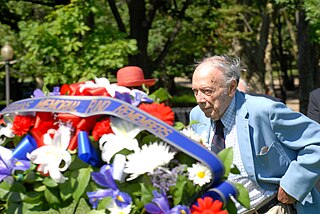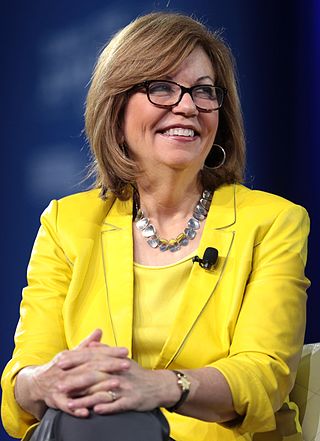Related Research Articles

The Pulitzer Prize is an award administered by Columbia University for achievements in newspaper, magazine, online journalism, literature, and musical composition in the United States. It was established in 1917 by provisions in the will of Joseph Pulitzer, who had made his fortune as a newspaper publisher.
Jay Anthony Lukas was an American journalist and author, best known for his 1985 book Common Ground: A Turbulent Decade in the Lives of Three American Families. Common Ground is a classic study of race relations, class conflict, and school busing in Boston, Massachusetts, as seen through the eyes of three families: one upper-middle-class white, one working-class white, and one working-class African-American.
Farnaz Fassihi is an Iranian-American journalist who has worked for The New York Times since 2019. She is the United Nations bureau chief and also writes about Iranian news. Previously she was a senior writer for The Wall Street Journal for 17 years and a conflict reporter based in the Middle East.

The Dallas Times Herald, founded in 1888 by a merger of the Dallas Times and the Dallas Herald, was once one of two major daily newspapers serving the Dallas, Texas (USA) area. It won three Pulitzer Prizes, all for photography, and two George Polk Awards, for local and regional reporting. As an afternoon publication for most of its 102 years, its demise was hastened by the shift of newspaper reading habits to morning papers, the reliance on television for late-breaking news, as well as the loss of an antitrust lawsuit against crosstown rival The Dallas Morning News after the latter's parent company bought the rights to 26 United Press Syndicate features that previously had been running in the Times Herald.

Stanley Abram Karnow was an American journalist and historian. He is best known for his writings on East Asia and the Vietnam War.

Susan Lea Page is an American journalist, political commentator, and biographer, and the Washington, D.C. bureau chief for USA Today.
Barry Leon Bearak is an American journalist and educator who has worked as a reporter and correspondent for The Miami Herald, the Los Angeles Times, and The New York Times. He taught journalism as a visiting professor at the Columbia University Graduate School of Journalism.

Steve Coll is an American journalist, academic, and executive.

The Sarasota Herald-Tribune is a daily newspaper, located in Sarasota, Florida, founded in 1925 as the Sarasota Herald.
Richard Beebe Dudman was an American journalist who spent 31 years with the St. Louis Post-Dispatch during which time he covered Fidel Castro's insurgency in Cuba, the assassination of President John F. Kennedy, the invasion of Cuba at the Bay of Pigs, the Watergate scandal, the Iran-Contra scandal, and wars and revolutions in Latin America, the Middle East, and the Far East. He was chief of the Washington bureau during the 1970s which landed him on the master list of Nixon political opponents.
Glenn Frankel is an American author and academic, journalist and winner of the 1989 Pulitzer Prize for International Reporting. He spent 27 years with The Washington Post, where he was bureau chief in Richmond (Va.), Southern Africa, Jerusalem and London, and editor of The Washington PostMagazine. He served as a visiting journalism professor at Stanford University and as Director of the School of Journalism at the University of Texas at Austin. Author of five books, his latest works explore the making of an iconic American movie in the context of the historical era it reflects. In 2018 Frankel was named a Motion Picture Academy Film Scholar. He was named a 2021-2 research fellow of the Leon Levy Center for Biography at the City University of New York for a book about Beatles manager Brian Epstein.
Jeffrey A. Gettleman is an American Pulitzer Prize-winning journalist. Since 2018, he has been the South Asia bureau chief of The New York Times based in New Delhi. From 2006 to July 2017, he was East Africa bureau chief for The New York Times.
Eugene Leslie Roberts Jr. is an American journalist and professor of journalism. He has been a national editor of The New York Times, executive editor of The Philadelphia Inquirer from 1972 to 1990, and managing editor of The New York Times from 1994 to 1997. Roberts is most known for presiding over The Inquirer's "Golden Age", a time in which the newspaper was given increased freedom and resources, won 17 Pulitzer Prizes in 18 years, displaced The Philadelphia Bulletin as the city's "paper of record", and was considered to be Knight Ridder's crown jewel as a profitable enterprise and an influential regional paper.
Bob Drogin is an American journalist and author. He worked for the Los Angeles Times, for nearly four decades. Drogin began his career with the Times as a national correspondent, based in New York, traveling to nearly every state in the United States. He spent eight years as a foreign correspondent, and as bureau chief in Manila and Johannesburg, before returning to the U.S. He covered intelligence and national security in the Washington bureau, from 1998 until retiring in November 2020.
Barbara Demick is an American journalist. She was the Beijing bureau chief of the Los Angeles Times. She is the author of Logavina Street: Life and Death in a Sarajevo Neighborhood. Her second book, Nothing to Envy: Ordinary Lives in North Korea, was published by Spiegel & Grau/Random House in December 2009 and Granta Books in 2010. Her third book Eat the Buddha: Life and Death in a Tibetan Town, focusing on the life of Tibetan people in Ngaba, Sichuan, China, was published in July 2020 by Random House.

John Lawrence Seigenthaler was an American journalist, writer, and political figure. He was known as a prominent defender of First Amendment rights.
Donald Gerard McNeil Jr. is an American journalist. He was a science and health reporter for The New York Times where he reported on epidemics, including HIV/AIDS and the COVID-19 pandemic. His reporting on COVID-19 earned him widespread recognition for being one of the earliest and most prominent voices covering the pandemic.
Eileen Sullivan is an American journalist who has covered counter-terrorism and national security for The Associated Press and The New York Times. She won a Pulitzer Prize for Investigative Reporting in 2012.
Tina Susman is an American journalist and editor. A senior editor at Time from 2019-2022, she was previously the national editor for BuzzFeed News and while at the Los Angeles Times had multiple roles, starting as Baghdad bureau chief and moving on to become a national correspondent based in New York. Prior to that she oversaw and contributed coverage from at least 15 countries in Africa for the Associated Press and Newsday, part of the over-five-fold trend in the increase of women war correspondents from 1970 to 1992. She left Time in 2022 and was a senior editor at the tech news site Protocol.com until its closure in December 2022. While reporting for the Associated Press in 1994, Susman was kidnapped in Somalia and held for 20 days. For this, she was featured in an episode of Oprah and on MSNBC among other outlets, and her case became the subject of debate about whether the Associated Press should have withheld news of the kidnapping.
Robyn Dixon is a journalist and Moscow bureau chief for The Washington Post.
References
- ↑ "The New York Times Knowledge Network". Archived from the original on 2012-02-16. Retrieved 2012-01-04.
- ↑ Robert F. Kennedy Memorial Accessed May 3, 2007.